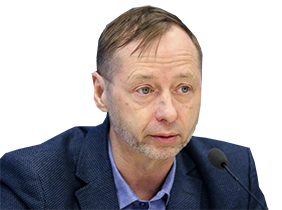The State Duma on January 23 is set to consider constitutional amendments put forward by Russian President Vladimir Putin.
The draft of what the Kremlin chief believes are necessary constitutional changes once again testifies that Putin does not and has never intended to abandon power in Russia. He plans to stay "at the helm" in any form and shape possible because he understands what will happen to him personally and his immediate entourage once he loses the top seat. See, in Russia, there's a certain tradition regarding long-time rulers, which Putin might not really like…
Putin is eager to get into history textbooks
Moreover, the further Vladimir Putin embarks on his "historic mission", the more he tries on the role of a "world ruler", a very influential man who is building a new world order and a new security system.
Putin is eager to get into history books. And to this end, he first needs to remain in power for life, and secondly, to build power architecture that will allow blackmailing the rest of the world, all civilized states, so that they are compelled to heed Putin's wishes.
In fact, it was for such purposes that Vladimir Putin proposed to amend the Russian constitution: the first goal is to remain in power for life, and the second one is to acquire tools that will help him realize the idea of a "Russian World" and stay on par with God. The latest innovations will contribute to achieving such goals. It's about setting up a State Council with functions that are yet unclear, imposing new restrictions on presidential candidates, etc.
So far, it seems that Putin himself has not decided in what position he will take up to stay in charge of Russia. Most likely, he will become a "nation leader". That is, it may well be that Putin plans to lead that new body, the State Council, which will allow him to remain a key figure in the country, as is the case in China.
A very important point of change that Putin is promoting is a norm about the primacy of national legislation over international law, i.e. over any international agreements, treaties, and such. This means that, even if Russia has signed with any country a treaty of friendship, cooperation and non-aggression, unless it's approved by the State Duma, the document simply doesn't exist for Russia. Similarly, Russia can retroactively waive its obligations under any treaty that has not been approved by the State Duma.
It is worth noting, for example, that the Duma never ratified the agreements on the dissolution of the Soviet Union. Therefore, Russia has no obligations to the countries of the former Soviet Union to preserve and respect their borders, as they were never endorsed by the Russian legislature. By affirming the primacy of national law, Moscow will be able to abandon any previous agreements regarding the territories of the former USSR and even the former Warsaw Bloc, meaning that this may even affect Poland, Romania and a number of other countries.
If Russia can't impose something on the world economically, like China, what they do is resort to blackmail
In addition, Moscow will now be able to drop any treaty that prevents Russia from implementing its policies, such as on the use of medium-range and short-range missiles , nuclear weapons tests, or pretty much anything that would allow Russia to aggresively blackmail the world. If Russia can't impose something on the world economically, like China, what they do is resort to blackmail. By changing the constitution, Putin is paving way toward such actions.
Thus, the threat looming over all post-Soviet states is now significantly higher as they might be aggressively pulled to rejoin the revived version of the Soviet Union, or the "Union of Slavic Republics". This is especially true for Belarus and Ukraine. These intentions are already visible in Moscow's actions towards Minsk. As for Ukraine, the Kremlin believes that it is possible to exert more pressure on Volodymyr Zelensky and that he will concede.
Therefore, none of the post-Soviet countries can feel safe in the future.
There will be no internal shifts in Russia as a result of constitutional transformations at Putin's request. The "tsar, boyars, and people" system of power will remain in place. However, there is one important nuance –during any major transformation processes in Russia, not quite all goes as planned. Remember, for example, how Gorbachev tried to modernize the Soviet Union – and we all know what it all has led to. Therefore, the reform Putin is now trying to implement in his favor may not go the way he sees it. In particular, I believe the ongoing centrifugal processes may intensify in Russia, as well as criminal mob wars, confrontation between security agencies, as well as the natural row between Muslim fundamentalists and the Orthodox, and so on. Also, I don't rule out the emergence of some "people's republic" somewhere, say, in Siberia, as part of those centrifugal processes. That's very likely, actually.
However, Putin is convinced that he will keep everything under control as he thinks he always does.
Oleksandr Kochetkov is a Ukrainian political analyst


